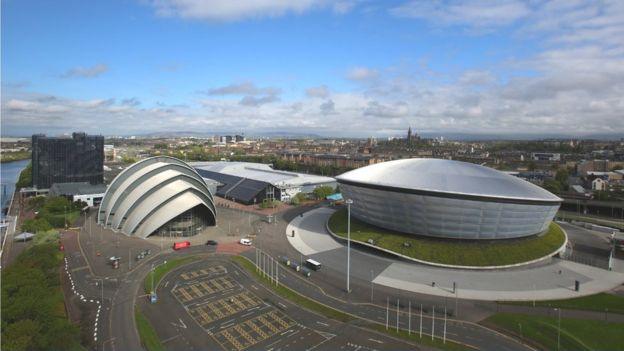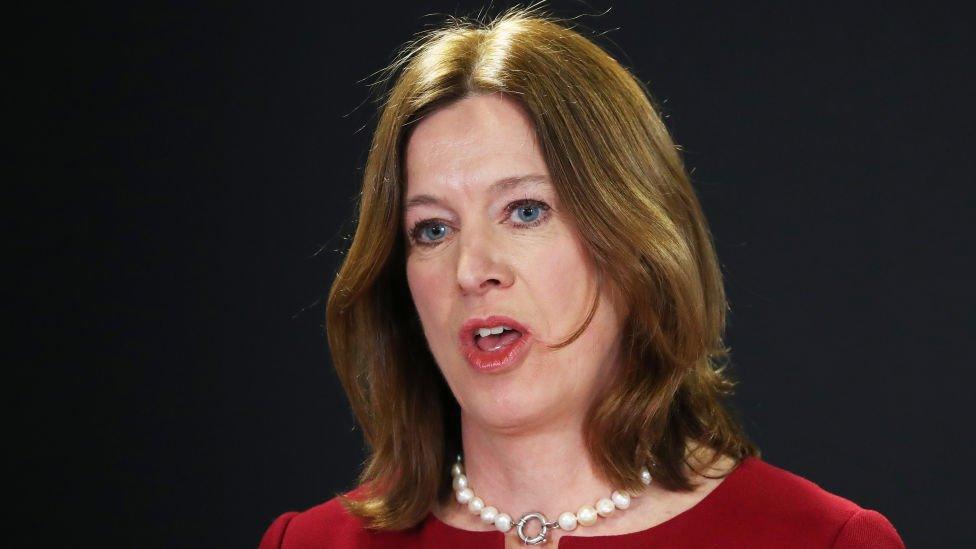Coronavirus: NHS field hospital plans for Scotland
- Published

Army engineers have been looking at whether SEC could become a temporary hospital
NHS field hospital sites in Scotland will be identified this week ahead of a predicted rapid rise in Covid-19 cases, the chief medical officer has said.
Dr Catherine Calderwood said she agreed with a senior medic who expects a coronavirus "tsunami" in coming weeks.
The army has confirmed officers from the Royal Engineers have been assessing the SEC in Glasgow as a temporary hospital location.
It stressed that any facilities would be run by the NHS.
Dr Calderwood said Scotland was looking to set up temporary hospitals similar to one planned for London.
She also revealed that new distribution systems for protective equipment were being set up.
The ExCel exhibition centre space in East London is being prepared as a 4,000-bed field hospital, to be staffed by NHS medics with the help of the military, and there are reports that the NEC in Birmingham could take on a similar role.
Dr Calderwood said sites in Scotland for such facilities were "absolutely" being looked at.
She told BBC Radio's Good Morning Scotland programme: "We have had quite detailed discussions very recently and I know that there are sites being considered in Scotland this week."
The army in Scotland has said military liaison officers will be working with health boards.
Senior officers are now working at the Scottish government headquarters, St Andrew's House, coordinating their efforts with civil servants.
The Scottish government said the assistance of the Royal Engineers at the SEC would inform their contingency planning.

Dr Catherine Calderwood said the country was on the cusp of a rapid increase in cases
The chief medical officer was asked about comments by the vice-president of the Royal College of Emergency Medicine, Dr David Chung, who has warned that the dramatic explosion in coronavirus case numbers in London could be replicated in Scotland.
She said: "Unfortunately, the emergency medicine doctor is absolutely right. We have people with mild illness, as we know 80% of people - but up to 20% of people will have a much more significant illness."
So far, there have been 25 deaths in Scotland, while across the UK 475 people with the virus have died.
'Just a time issue'
Dr Calderwood said the lower Scottish death figure may simply reflect the time it takes for infected people to develop symptoms and become seriously ill.
"You can be ill for two to three weeks before you're hospitalised," she said.
"I'm worried that these low deaths are actually just because we haven't had the virus in Scotland for as long as they have had it in England
"In other words, there hasn't been enough time for people to get more unwell and hospitalised and onto that stage where they're needing intensive care.
"This is probably just a time issue rather than a lower death rate per se."

A SIMPLE GUIDE: What are the symptoms?
AVOIDING CONTACT: Should I self-isolate?
MAPS AND CHARTS: Visual guide to the outbreak

The chief medical officer said she was hearing from NHS colleagues that they were worried about their personal safety due to shortages of protective equipment.
"This makes me very uncomfortable," she said.
"To send people to work on the frontline when they are worried that the masks, in particular, will run low or run out.
"We are also hearing of people using masks when actually they don't need to be using them - that is depriving them, somebody else who does need the mask."
New equipment distribution system
Dr Calderwood said the distribution model for protective equipment was being changed to ensure supplies were delivered to the right places in the right quantities.
"It seems we had not enough that were coming in a timely fashion. People were ordering from GP surgeries or from hospitals ordering many, many more masks than they would ever have before," she said.
"That seems to have clogged up the system with huge orders for which there weren't enough supplies so the order didn't get processed at all."
Separate distribution lines have now been set up for primary care, social care and hospitals to speed up the process.
"Distribution should not be a problem after this week," she said.
Dr Calderwood said testing was prioritised "quite rightly" for those requiring hospital treatment, as well as surveillance testing to provide information about the spread of the virus.
She was asked why Prince Charles and his wife Camilla were tested for Covid-19 in Aberdeenshire when the heir to the throne was only displaying "mild symptoms".
She said: "My understanding is there were very good clinical reasons for that person and his wife to be tested. Obviously I wouldn't be able to disclose anything else that I know because of patient confidentiality."